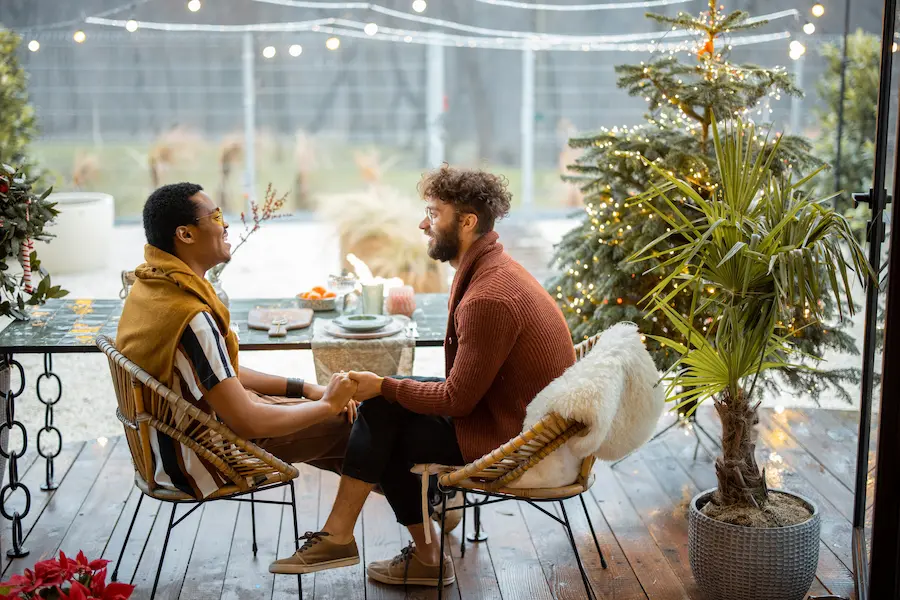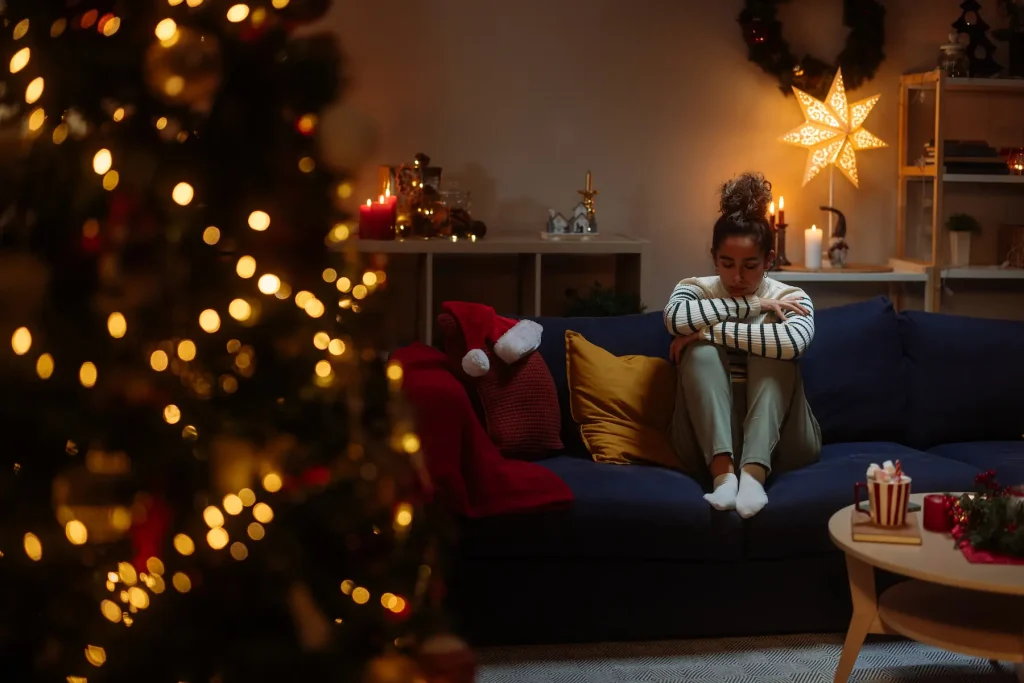Mike finds his wife’s “explosion” of anger “unbearable.” When she gets angry, he tries to neutralize or fix her feelings. He often tries to problem solve before understanding why Stacey is upset. This makes Stacey feel dumb for experiencing and expressing her innate feelings. It also makes her feel like her emotional reality is something to be fixed and not legitimate.
The root of this conflict between Stacey and Mike can be found all the way back in their childhoods and how they were taught to view emotions.
For Stacey, her family was as okay with her feeling angry or sad as with her feeling joyful. All emotions were seen as legitimate and valuable—even the more difficult or less pleasant ones.
Mike’s family, on the other hand, instead of accepting emotions, tried to change them or prove to him that his feelings were “irrational.” As a result, any dark emotions overwhelm him, just as they did his family, and he seeks to control, suppress, and change them.
Since they view emotions so differently, Mike and Stacey both feel misunderstood when these darker emotions come up for either of them.
To understand each other better and create a more connected relationship, Dr. Gottman suggests using a weekly State of the Union meeting to start building the skills of attunement. Attunement is the capacity to be in harmony with your partner’s feelings. When couples attune to each other, they feel more connected and loved and have better sex.
In the first three installments of this State of the Union Column, we discussed the speaker’s responsibilities:
Speaker’s Role
A = Awareness
T = Tolerance
T = Transforming criticisms into wishes and positive needs
This week, we are now turning to the listener’s first responsibility in Dr. Gottman’s ATTUNE model:
Listener’s Role
U = Understanding
N = Non-Defensive Listening
E = Empathy
During his research, Dr. Gottman discovered that problem solving or giving your partner advice before understanding their feelings or perspective is counterproductive and actually interferes with reaching a resolution. Learning how to use conflict as an opportunity to understand and get to know each other better is a vital part of attunement.
The opportunity in negative emotions
In every close relationship there is the potential to share all emotions in their raw, ugly beauty, and, through that sharing, the opportunity to connect more deeply with your partner. But, if you grew up similarly to Mike and learned to dismiss or ignore your more difficult emotions, you may not feel comfortable embracing these emotional opportunities for connection.
The problem with dismissing emotions is that when emotions are banished they don’t vanish. As Susan David, Ph.D., says, bottling emotions leads to lower levels of well-being as well as high levels of depression and anxiety. It’s easy to see how this, over time, decreases the quality of your relationship.
I’ve heard many ask, “What is my partner trying to accomplish by being emotional?”
But what they are really asking is, “What is my partner trying to accomplish by showing negative emotions?”
I rarely, if ever, hear someone ask this question about emotions like joy, excitement, or passion. No one has an issue when their partner expresses those more positively perceived emotions.
Emotions are often labeled as problems when they are deemed to be one of the negative emotions such as sadness, anger, fear, disappointment, jealousy, loneliness, shame, and insecurity. Many believe that talking about these feelings will make things worse. This is false.
Emotions are as natural as breathing. They’re fleeting and messy and awful and wonderful, and they are all part of being human. All emotions are healthy—positive, negative, it doesn’t matter—unless we choose to bottle or brood over them. There is an evolutionary advantage to each and every emotion. And in today’s modern world, they offer insight into what we truly value.
My point is that all emotions are acceptable. As Dr. John Gottman says:
“Emotions have their own purpose and logic. Your partner cannot select which feelings to have. Their feelings come up unconsciously. If you can’t get beyond the belief that negative emotions are a waste of time and even dangerous, you will never be able to attune to your partner enough to have true intimacy.”
But, while all emotions are acceptable, all behavior is not.
By seeking to understand why your partner feels the way they do, you can learn a lot about them. By accepting their emotions and striving to learn more about why they feel the way they do, you build a bridge to greater connection.
Saying things like, “You’re making it a bigger deal than it is,” or “Calm down, you’re not thinking clearly,” are rarely effective. These statements only succeed in diminishing your partner and trivializing their emotional experience.
Instead try, “Please help me understand what has you so upset.” This approach provides an opportunity for your partner to process what they are feeling and for you to more deeply understand where your partner is coming from and who they are as a person.
Emotions are opportunities for intimacy. They are a gateway to building emotional connection and trust.
As the listener in your State of The Union, your first role is to seek understanding—to gain insight into the emotions your partner is feeling.
When I watch couples do this in my practice, both feel heard and emotionally closer. When one partner is unwilling to understand or let themselves be understood by their partner, the problems in their relationship fester and the disconnect and loneliness they feel increase. One of the biggest reasons this happens is due to the listening partner feeling responsible for making their partner happy.
Your partner’s feelings are not your responsibility
When Mike would listen to Stacey, he felt like it was his responsibility to transform her bad mood into a more positive, optimistic one.
He believed his role as her husband was to make her happy. When she was sad or frustrated, he would offer a way to solve the problem or tell her how he would choose to feel if he were in the same situation.
Big mistake.
By dismissing her feelings and telling her she is “blowing things out of proportion,” he made her feel as though she shouldn’t feel what she was feeling and that something was wrong with her.
Over time, she grew to resent him. This pushed them farther apart from each other. They started having less sex, were less playful with one another, and they started feeling like housemates instead of lovers.
What could Mike have done differently?
It goes back to attunement. It always goes back to attunement. Want to fix your relationship? Attune to each other. Want to deepen your bond and have greater intimacy? Attune to each other.
Mike didn’t need to problem solve or fix Stacey. He just needed to understand that she wanted to feel less alone.
For most of us, realizing we just have to understand and not problem solve is a huge relief. And the payoff is huge. When you attune, your partner feels safer with you. And when your partner feels safe, life is good. Sex is good. Your relationship becomes playful and joyous.
Over time, Mike learned that no harm would happen to their relationship if he simply listened to Stacey instead of giving advice. He learned to accept that he cannot control what she feels and that it is not his job to get his wife to cheer up, calm down, or develop a sense of humor. All she needs is for him to listen to her, understand her, and care.
Discover your partner’s uniqueness
The goal of attunement is to understand the unique, amazing, annoying, complex, frustrating, and fascinating person you are in a relationship with.
Any relationship between two people will have issues. No two people will ever agree on everything. And trying to turn your partner into you prevents you from growing yourself.
When you give up trying to change your partner into handling situations or problems like you, you can attune to them as they are and that’s when real intimacy blooms.
When seeking to understand your partner, it’s best to slow down and ask open-ended questions that help you understand them more. When you think you understand, then reflect back what you heard and ask your partner, “Did I get it right? Am I understanding you correctly?”
They may say yes or go on to explain some piece or aspect that you didn’t fully understand. If they do feel understood, there is one big question I love to have my couples ask that helps open up the deep emotions and the underlying meaning or cause of the conflict:
“Is there more to this?” Asking this question opens your partner up to sharing more about what’s buried deep inside.
The State of the Union weekly meeting is a dance. The goal of the listener is to appreciate your partner’s emotions: their meaning and history, and whatever events that may have escalated the conflict or hurt feelings.
When you seek to understand your partner, you gain access to a superpower that can transform the barriers of conflict that arise out of differences into bridges of intimacy.
The next blog post will teach you listening tools that will help you to be less defensive so you can understand your partner and work through issues together more effectively.








